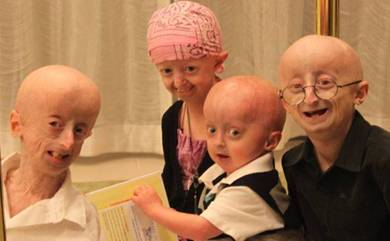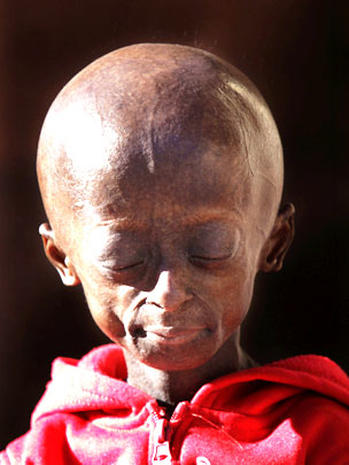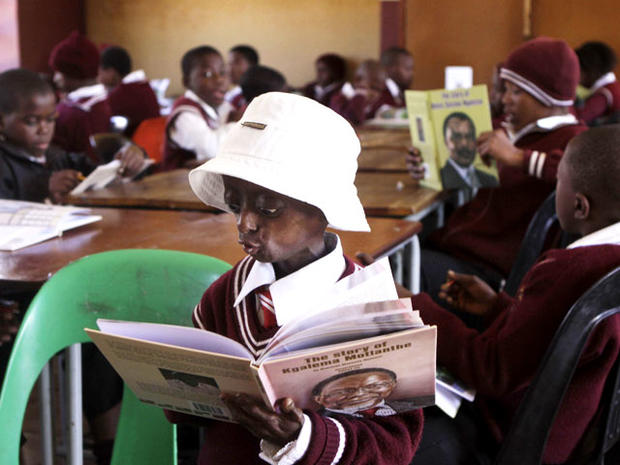Others people might use plastic surgery, Botox, and Collagen
to looks young. But, it’s hard and impossible for these people to get young
even if they want to and even if they use all of the medicine.


This is Ontlametse.
She lives in South Africa with her mother and dreams of
being a psychologist. She goes to school along with all the other kids her age.
She's a bright pupil, but has been scorned by classmates, teachers and others
who think her figure means she has a contagious disease. She call herself a
first lady because she is the first black child with this disease.
I’m refer to a very rare disease
called Progeria. It is a rare, fatal genetic condition characterized by an
appearance of accelerated aging in children. Eventually most of the patient are
young. Very, very young. Although
they are born looking healthy, children with Progeria begin to display many
characteristics of accelerated aging at around 18-24 months of age. It’s an extremely rare genetic disease that effect one in 4
- 8 million new-borns worldwide. According to statistic, there has 134 children
in 46 countries that living with Progeria. The average lifespan of an individual with Progeria
is only 13 years, with a range of from 7 to 27 years. In the past 15 years, children
with Progeria have been reported all over the world, including in Argentina,
Australia, Africa, Belgium, Canada, and China.
Today I will tell you about the sign
& symptom of Progeria.
The skin start to aging
To
be specific, Hutchinson-Gilford Progeria Syndrome
(HGPS) or progeria is a disease where the appearances and physical
characteristics of the patients are similar to an elderly individual or in
other word they look like an elderly person. Their skin start to aging eight times
faster than normal. A child
of ten years will have similar respiratory, and cardiovascular conditions that
a 70-year-old would have. This is because, like I mention before, progeria
patient start to display a characteristics of accelerated aging at around 18-24
months of age although they are born normal and healthy. Take Ontlametse
for example, her mom say her baby was born looking normal but that she realized
early on that something was wrong. The baby suffered constant rashes and by the
time she was three months old Phalatse thought she had a skin disease. Other than that, the appearance of
progeria patient are so similar to each other that could be mistaken as a
siblings even though they are from different background. It is
important to remember that all children with Progeria have age appropriate
intellect and personality. An eight-year-old with Progeria will think and act
just like every other eight-year-old. Children with Progeria are smart and
funny and full of life. It's the bodies of these children that are aging, not
their minds.

Their grow start to slow and much shorter
than others in their age.
Their
growth and development appear normal during the first year of life but start to
slow and much shorter than others in their age because of the progress somewhat
below average. Although there is a very slow increase in height which may
eventually reach that of a normal 3-year old child during this time, the
slowness of the grow did not affect their talking and walking.
Ontlametse, who is half the size of her classmates, stands on a desk
surrounded by her classmates. Ontlametse sits at her desk as her best friend,
Katlego Mathabe, reaches down to her level during class.
Progeria
patient are normal at birth although the tendency is for the birth weight to be
less than (2.5 kg). Their weight remains almost the same at the one-year level and
slightly increase only during the first decade. Both the increase in weight and
in length remains behind but the weight increases the less and there will be no
increase in the growth process in the pre-puberty or puberty.

Hair
lost, clear visible blood vessels and the eyes
Early
in the second year their hair will fall out so easily and be replaced by a few
fuzzy. That’s make them get downy hair. Their hair of eyebrows and eye members also
disappears almost entirely. The hair lost make
their head bald and, a clear visible blood vessels
can be seen. Because of the very slow increase in height there is an illusion
of a large head which is accentuated by the lack of hair except for a fine
downy growth and prominent scalp veins. The eyes are normal but often seem
large in relation to the face which is thin and somewhat drawn out because of the
decreased size of the facial bones.
Kids with progeria occur out of
blue. There's no family history, no warning, no reason to think that this might
be getting ready to happen,”. The
diagnosis of Progeria is a huge shock for family members. Unconditional love is
absolutely necessary for these children. The child must have the opportunity to
act and behave as a normal child.
In the past, doctors had to base a
diagnosis of progeria solely on physical symptoms, such as skin changes and a
failure to gain weight, that were not fully apparent until a child's first or
second year of life. But nowadays, a genetic test for Progeria, is currently
available. This genetic test now enables doctors to diagnose a child at a
younger age and initiate treatment early in the disease process.
All picture/video and information from google, jurnal article and news and PROGERIA RESEARCH FOUNDATION..



